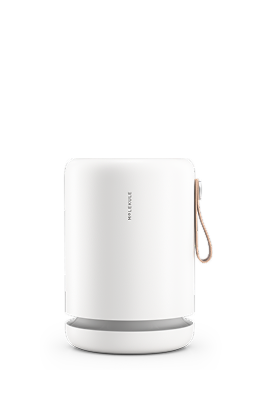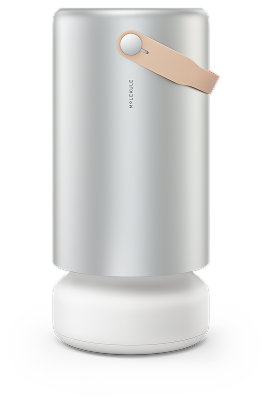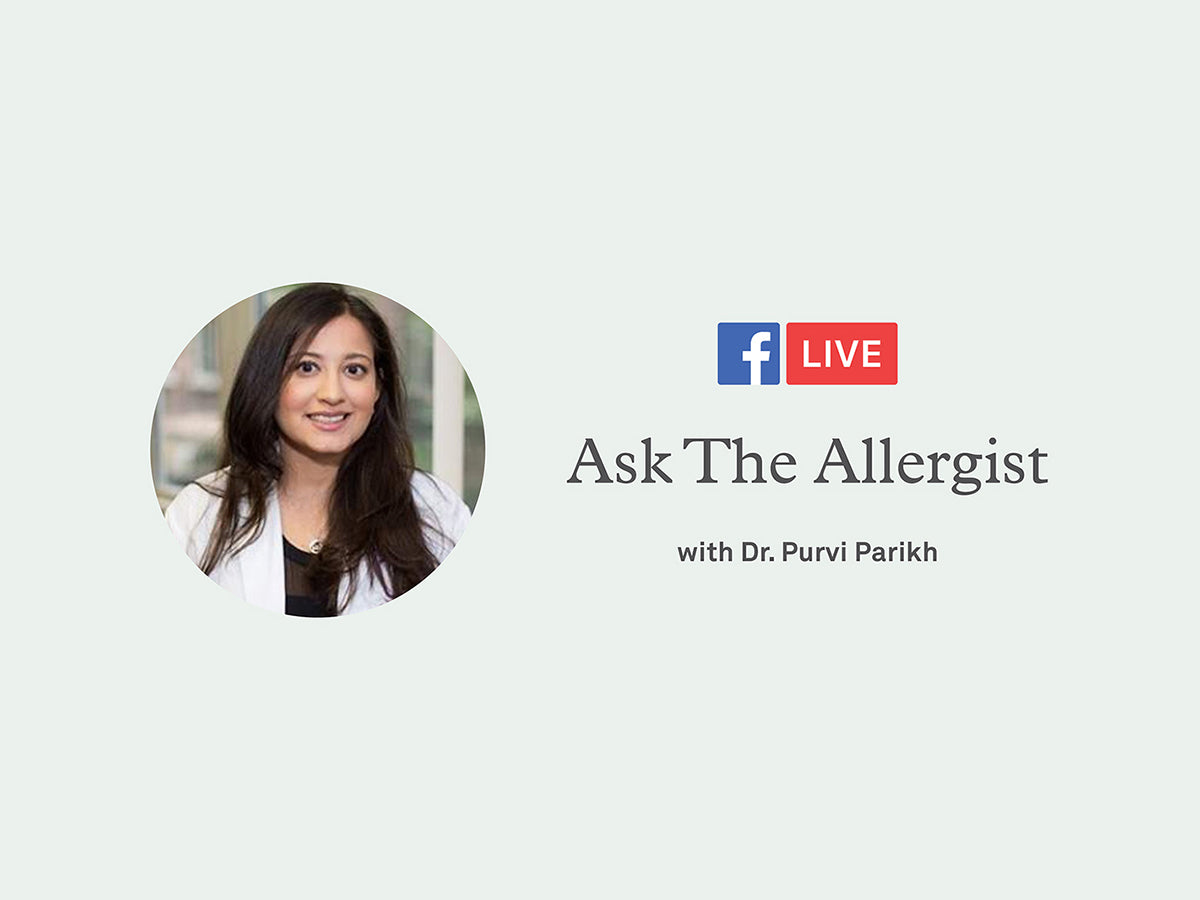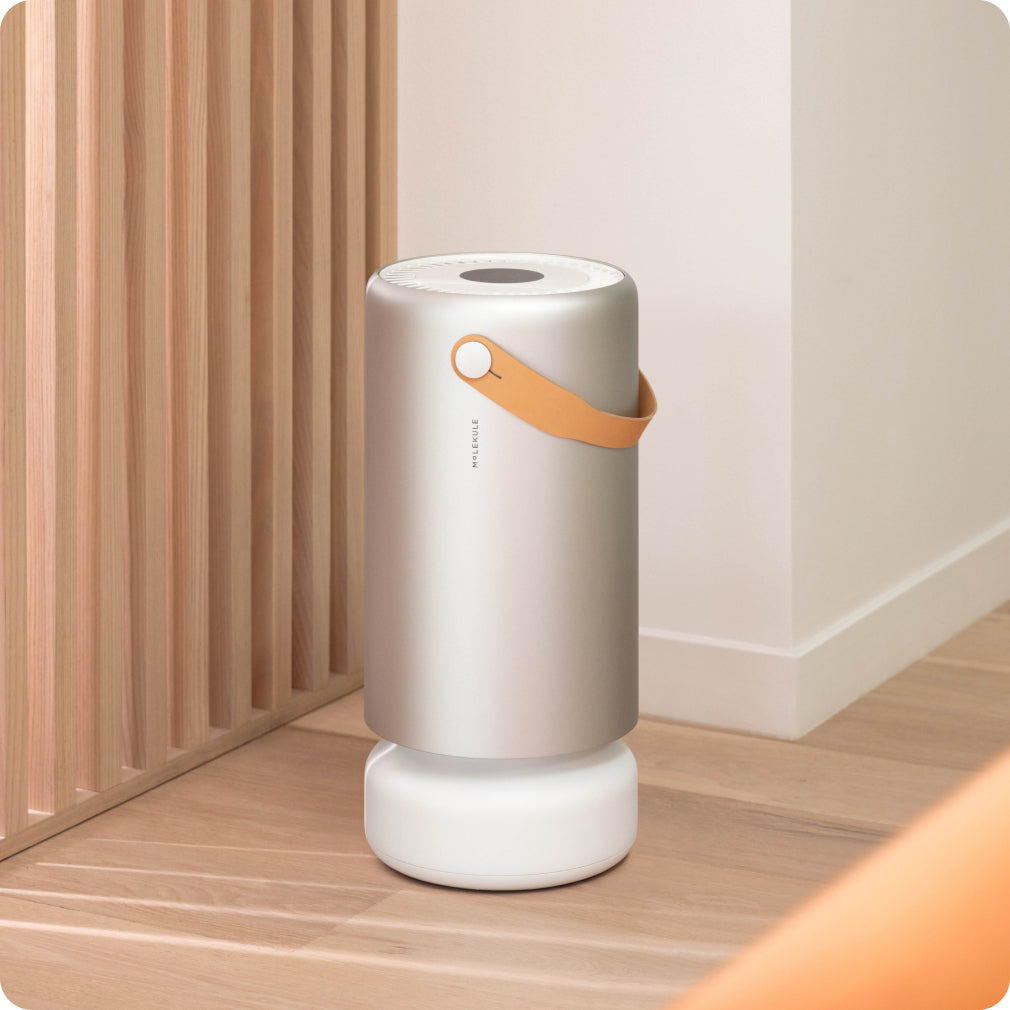21 Questions & answers from “Ask The Allergist” with Dr. Purvi Parikh
21 Questions & answers from “Ask The Allergist” with Dr. Purvi Parikh
If you suffer from seasonal allergies, you may expect the springtime routine of constant sneezing and itchy, watery eyes. However, new information could help you this season. Find out more about the myths and misconceptions about this year’s pollen explosion. The below interview took place on May 15, 2018 on Facebook Live. Jaya Rao, co-founder and COO of Molekule, sat down with allergist Dr. Purvi Parikh to talk about the missing facts behind seasonal allergies.
Dr. Parikh is a pediatric and adult allergist, as well as an immunologist who practices in Manhattan. She is a professor at the NYU School of Medicine, spokeswoman for the Allergy and Asthma Network and frequently appears as a medical contributor to CBS, CNN, FOX, NBC and Wall Street Journal. And most importantly, she knows what it’s like to have allergies!
Note that the interview transcript below has been edited and condensed for clarity. Bolded questions 1-13 and 18-19 were asked by Jaya Rao, co-founder and COO of Molekule. The remaining questions were asked by the Molekule Facebook community.
Contents
- Q1: Are allergies getting worse?
- Q2: How often do you see people developing allergies later in life versus in childhood?
- Q3: Is there something in particular that causes me to be predisposed or is it just random?
- Q4: What symptoms mean you’re suffering from really bad allergies?
- Q5: When do you recommend that a person go to an allergist like yourself and get diagnosed?
- Q6. What are the best ways to give your body a break from allergies during allergy season?
- Q 7. Is there a reason why people feel so tired in the morning or really lethargic at work?
- Q8. How do we manage these conditions?
- Q9. Are there places that people would be surprised they’re actually getting exposed to allergens?
- Q10. Is there a reason that causes us to potentially wake up with itchy eyes, runny nose, those types of things?
- Q11. What are things we could do inside of our homes to actually get a restful night’s sleep?
- Q12. Does desensitization mean allergy shots?
- Q13: How long does this typically take to go through these types of treatments?
- Q14. Do steroids shots help for seasonal allergies and what are the long term effects?
- Q15: What else can I do to help my 3-year-old son’s terrible seasonal allergies?
- Q16. What are the first steps to take to relieve allergy symptoms?
- Q17. Do symptoms typically occur right after exposure?
- Q18. Is there a list or resource of doctors in different states to get allergy tests?
- Q19. Are there any other resources you recommend to learn more about how to manage allergies?
- Q20. What’s on the horizon in this field?
- Q21. Can you recommend a good place to find diet guidelines for food allergies?
Jaya: Welcome to our very first Facebook Live! For those of you who don’t know me, I’m one of the co-founders of Molekule.
I’m very excited to have Dr. Purvi Parikh here. She is a well-known allergist and immunologist, both pediatric and adult. She is also a professor at the NYU School of Medicine. She has made numerous appearances as a medical contributor on CNN, NBC, FOX, Wall Street Journal, and CBS. She also happens to be a spokesperson for the Allergy and Asthma Network.
This Facebook Live session is being shared with folks on the Allergy and Asthma Network, so we’d like to welcome them as well. And a little more about Dr. Purvi Parikh - She has her own column on US News & World Report. So very well distinguished in the space.
We’re very excited to have her here today. Thank you, Dr. Parikh, for taking some time out to speak with us!
Dr. Parikh: Thank you for having me.
Jaya: Great, so a little bit about why we’re so excited to talk to you about seasonal allergies. It relates back to a personal story for me, which is that my brother grew up with allergies and asthma. And that was actually the reason that my father originally created the technology behind Molekule, which is called PECO.
For those of you who don’t know, Molekule is a brand new air purification technology and it came out of 20 years of research and development by my father. The reason he looked to develop it was he saw my brother Dilip suffer from allergies and asthma as a kid.
And so we understand very personally how difficult it can be for people. We wanted to pass on useful information and tips that can help, especially now that we’re in the thick of allergy season. We’re happy that you had some time to talk with us.
So with that, I thought we’d ask a few questions and then open it up to audience questions that come later on.
Q1: Are allergies getting worse?
Jaya: You know, I was just reading an article on NBC the other day, and it was saying that there’s been an allergy explosion, that this year, allergies are the worst ever.
Dr. Parikh: There actually is some truth to that. More people are suffering, and their symptoms are more severe.
There are a few reasons behind that. Climate change is making allergy season much longer. Also, because of increasing levels of carbon dioxide in the air, “super plants” are producing much more potent pollen and for longer periods of the year. Certain areas of the country that don’t normally get bad seasonal allergies are now experiencing them.
The second thing is something called the hygiene hypothesis, which is basically that we’re becoming too clean and too industrialized of a society. By living in cities, over-sanitizing things, eating processed foods, we’re no longer exposed to good bacteria that protect us from developing allergies and asthma. So there is some truth to it.
Jaya: You know it’s interesting because I see that you’re both an adult and pediatric allergist. I didn’t grow up with allergies. Many years later when I was in college, I started feeling like I was waking up with a cold every morning. When I went to my physician, we found out that it wasn’t a cold, it was allergies.
Q2: How often do you see people developing allergies later in life versus in childhood?
And what causes it to develop later on?
Dr. Parikh: We see it all the time, actually. It’s usually environmental allergies that you develop later in life or as an adult. Luckily, food allergies are rarer to develop as an adult, although it is possible. Everything environmental that you breathe in like pollen, dust mites, mold, animal dander — all of those you can develop at any time.
Q3: Is there something in particular that causes me to be predisposed or is it just random?
Dr. Parikh: It’s a combination of genetic and environmental, so if you have one parent who has an allergy of any kind, you’re at 50 percent higher risk of having an allergy. And if two parents have an allergy, then the risk goes up even more. A lot of it’s environmental — climate change, as well as where we live. Ironically in cities like New York, where I am, allergies are very bad because the air quality is bad.
Q4: What symptoms mean you’re suffering from really bad allergies?
Dr. Parikh: A lot of the symptoms are identical to a cold. You can have watery eyes, sneezing, severe nasal congestion, even sore throat, coughing, wheezing.
The differentiating factors are usually that most colds last three to five days, maybe a week at most. Yet allergies can go on for weeks, even months. So if you notice your cold is lingering, it might be an allergy. Or if you notice it happens the same time every year, it may be an allergy. Also, allergies have more itchy symptoms — itchy eyes, itchy nose. So those are some ways you can differentiate.
Q5: When do you recommend that a person go to an allergist like yourself and get diagnosed?
Dr. Parikh: Well, if you notice that your symptoms have gotten worse and you’re not able to get them under control with over-the-counter medications, then you should definitely see an allergist to be tested. Be sure that it really is allergies and learn what the best treatment is.
If your breathing is involved at all, then 100%, go see a board-certified allergist right away. We have ten deaths a day in the US alone from asthma. So it shouldn’t be taken lightly. Any coughing, wheezing, shortness of breath — don’t try to manage it on your own.
Jaya: Wow, I didn’t even realize that. All the more reason to get more educated about what we can do to manage our conditions during these types of seasons.
Q6: What are the best ways to give your body a break from allergies during allergy season?
Or even outside of allergy season, how can you give your body the rest it needs?Dr. Parikh: If you’re prone to suffering from allergies and you know they’ll be bad, be proactive, come in early — ideally even before the season starts — to get on the appropriate medications that preventatively make a big difference. There are also things you can do outside of medications in your home environment, in your work environment, that can reduce your exposure to allergens.
Jaya: Got it. Actually, on that note, before we get into all of the solutions:
Q7: Is there a reason why people feel so tired in the morning or really lethargic at work?
Dr. Parikh: Yes, allergies occur because your body’s releasing a lot of inflammation in response to something it decides it is allergic to. So your nose gets inflamed and clogged with mucus and the passages get smaller. The same thing happens in your lungs; some people even have asthma attacks and trouble breathing. That constant inflammation causes headaches and difficulty breathing. Your body is working hard to get air in and out so you can breathe and
think clearly. That in itself is very draining and causes fatigue for many.
Jaya: Got it, okay.
Q8: How do we manage these conditions?
What are your go-to solutions?Dr. Parikh: Well it’s hard to live in a bubble, especially with environmental allergens everywhere, even with your best effort. Often, many people unfortunately will need to be on medications of some sort, whether that be a daily antihistamine or a steroid nasal spray, which are now over-the-counter and very good.
Again, if you do have breathing problems, it’s important you consult your doctor so you are on the appropriate medications for that too. Because the last thing you want is for that to be out of control. The nice thing is there are things that you can do non-medically as well. There are a lot of measures you can take to allergy-proof your house. Same goes for when you’re outdoors.
Jaya: That’s a good point about the outdoors versus at home.
Q9: Are there places that people would be surprised they’re actually getting exposed to allergens?
Dr. Parikh: Surprisingly, we always say that the bedroom is the most important room to keep allergen-free because all of us spend the most time there every night sleeping. And while you’re there you’re laying down, you’re breathing in allergens, constantly.
So the bedroom is especially important. Dust mite covers that encase your mattress and box spring create a barrier. Keeping windows closed, especially early in the morning when highest pollen counts arise. And air filters and purifiers also can help. People always get upset, but I say that if you do have a pet that causes you problems, keep your pet out of your bedroom as well.
Jaya: You know all of these things sound like they’re worthwhile interventions. Thinking about it, it makes sense your bedroom is a place where you spend a lot of your time. When I think back to my own experience, one of the worst moments I would have is early in the morning. Particularly for me, it was a sore throat.
Q10. Is there a reason that causes us to potentially wake up with itchy eyes, runny nose, those types of things?
Dr. Parikh: It’s very common because all night you’re laying down. So anything that’s in your nose (like allergens), any inflammation can drip down your throat almost like a post nasal drip. It even goes into some people’s lungs and causes breathing problems. And on top of that, pillows and mattresses are full of dust mites. You know even brand new ones. That’s why those covers are very helpful.
This explains why a lot of people have more symptoms at night; plus you’re often in one position breathing in everything that you may be allergic to. Whereas, during the day generally you are moving about, you’re upright, you’re walking.
Jaya: That makes sense now when I think about it in retrospect.
Jaya: What you’re saying is try to find solutions. I talk to a lot of people who say, Okay, I have my drug routine - these are the brands that I take. But I’d love to live a drug-free life, I’d love to wean off of these as much as possible. You mentioned some interventions, things like changing your bed sheets. Could you talk about that a little bit more.
Q11: What are things we could do inside of our homes to actually get a restful night’s sleep?
Dr. Parikh: Some interventions we mentioned include changing bed sheets frequently and keeping your room as clean as you can. It’s best to get rid of dust, mold, etc. that collects.
We also touched upon air purifiers. In the past, we mostly had HEPA air purifiers, which helped clear out mold and bacterial spores. That’s why I think your technology is very exciting because it even filters some of the more smaller allergens. It’d be exciting to see where that goes.
On top of that, we have medical approaches to make you less reactive. Even with the best filters and covers and everything, you’re still allergic. Sometimes we’ll put patients on a desensitization treatment, either allergy shots or sublingual ones, which actually make you stop reacting. It kind of builds up your immune system’s tolerance in a more natural way.
Jaya: Got it. You brought up a good point about other ways to deal with allergies. In fact, that was my father’s realization. They did a lot of these things, they changed out the bed sheets, they got rid of the carpets. But Dilip could tell the minute he walked into a room, or even outdoors–it was like an immediate reaction. He was the best sensor to tell us there was something wrong.
Dr. Parikh: Some people are that sensitive.
Q12: Does desensitization mean allergy shots?
What is that and how do people evaluate if they should be doing this type of treatment?
Dr. Parikh: Often, even with taking environmental measures we spoke of—the covers, the filters etc., and even taking medications on a daily basis—some people are still suffering, they’re still reacting, they’re still getting asthma attacks. The reason being that these measures just help minimize symptoms, but they don’t completely get rid of them if you’re very allergic.
The shots make you less allergic and some people achieve close to a cure. It’s taking very dilute doses of what you normally breathe in and introducing that to your immune system over periods of weeks, months, and eventually, years. It’s almost like going to the gym for your immune system. It trains your immune system to stop reacting to the dust mites or the pollen or the mold. So over time, you stop being as allergic. It really changes quality of life for a lot of people.
Q13: How long does this typically take to go through these types of treatments?
Dr. Parikh: Initially, it is a bit time consuming, because consistency is the way it works. We call it induced tolerance of allergens in your immune system. Initially, you have to go once a week for 6 – 8 months, depending on how you are tolerating the treatment. After that, it’s once a month for almost two years, so it’s a long process.
Most people feel better a few months into the treatment. The reason you stay on the shots for so long is it makes the change last as long as possible. Some people are able to almost have a permanent effect. They no longer have very severe allergies the rest of their lives, or they’re very mild. Studies show that 2 ½ – 5 years of staying on the shots will give you the best long term treatment.
Jaya: Got it. This is all very helpful and a lot of these questions were my own. Before this session, we went ahead and asked a lot of our community what questions do they have. We’re taking live questions on Facebook right now, but we have a couple of questions that came in earlier from some community members. I wanted to ask you a couple of those.
Deepa recently asked:
Q14: Do steroids shots help for seasonal allergies and what are the long term effects?
Dr. Parikh: Steroid shots are frequently used for seasonal allergies. Sometimes it’s so severe that in spite of medications and environmental measures, you’re still miserable. So they help nip the inflammation in the bud and break that cycle of inflammation. I’ve been treating patients with them all week.
The only issue is they’re like a temporary fix, so it doesn’t make your allergies get less over time or go away. With one shot in a given season, you won’t have the long-term side effects necessarily. We assess each patient individually to see if it’s appropriate for them. But if you are getting the shots every few weeks, it’s not a good idea, because the cumulative effect of steroids are not good. Whether you take them orally or by injection, you probably need a better plan for your allergies.
Jaya: Just clarifying for our community, this is different from what we talked about with the allergy shots. Allergy shots give you little-by little exposure to the thing giving you the allergy.
Dr. Parikh: And that generally has very little risk. I mean, we even give it to small children. We continue allergy shots even when women become pregnant. But steroid shots we use more sparingly when the allergies are very bad. Because if you give too many, it can come with side effects.
Jaya: Got it. Another question we have from Liz, who asks other than children’s Claritin and prescription allergy eye drops,
Q15: What else can I do to help my 3-year-old son’s terrible seasonal allergies?
Dr. Parikh: Well, there are other antihistamines that may work better. One is not necessarily better than the other, though one patient may do well with Claritin, while another patient may do well with Zyrtec or Allegra. So that’s one option.
But even better than that are steroid nasal sprays, many of which are over-the-counter now, such as Flonase or Nasacort. The nice thing about them is they work right where the problem is. Most of these allergens enter through our nose. But they also don’t have as many side effects, because it’s a topical medicine and not something that you swallow and goes into your body. The only thing is you have to be consistent. You need to use these sprays for at least a week before that they can start working. So it’s always good to start them early and be proactive.
Jaya: Ok great thank you. And so next question. Rhonda asks:
Q16: What are the first steps to take to relieve allergy symptoms?
Should I call up my doctor and try one intervention versus another?
Dr. Parikh: Again, it all depends, because the symptoms are so varied. One person may end up in the E.R. with an asthma attack (we see a rise in ER visits during allergy season), whereas one person may just have itchy eyes. So there is no one-size-fits-all recommendation.
But again, if you have anything that involves coughing or trouble breathing, then yes, call up your doctor first. But if it’s itchy eyes or a stuffy nose, you can first try an antihistamine tablet or a steroid nose spray, because they even help with eye symptoms, not just nasal symptoms. If you notice that after a few days of trying over-the-counter medicines that it’s not getting better, then you probably should go and seek attention from a physician so you can feel better and get on the right medications.
Sonia was wondering:
Q17: Do symptoms typically occur right after exposure?
If I go outside, do I immediately get symptoms to pollen or does it happen over the course of time?
Dr. Parikh: That is actually a great question, because it’s both an immediate as well as a cumulative effect. Yes, you can have symptoms as soon as 20 or 30 minutes of being exposed to something you’re allergic to. But for some people, the more you are exposed, the more the reaction gets worse and worse over time. So within the first 30 minutes, you might start feeling something, whereas an hour or two later, it can be much worse. That’s why we say to start the medications and avoidance measures early, because as that dose of allergen builds up, you’ll feel worse and worse.
We often tell people, especially during pollen season, to change your clothes when you come home. Take a shower if you can, so you don’t track pollen into your bed. Otherwise, it can stick to your skin and hair and make things worse all night.
Jaya: It’s funny you mention that. Because we’ve had a lot of our customers say that over the course of the night, they’re getting a little bit of relief from getting exposed to these things. It can actually seem to translate to a benefit long term. So we were excited to see that. And that actually makes a lot of sense that there could be these effects.
Jaya: Another question that came in from Christopher:
Q18: Is there a list or resource of doctors in different states to get allergy tests?
Dr. Parikh: That’s a great question. The American College of Allergy, Asthma, and Immunology (ACAAI) website has a place you can put in your zip code. It will generate a list of local board certified allergists. The same goes for a non-profit that I’m a part, the Allergy & Asthma Network. It’s a non-profit that’s meant for patients, and they also have a way to find a local allergist. I always stress that you see a board certified allergist to get the best possible care.
Jaya: Got it. I suspect it is hard to figure out whom you should go to. Having these types of resources is really helpful.
Q19: Are there any other resources you recommend to learn more about how to manage allergies?
What can a person do to learn how to improve their quality of life?
Dr. Parikh: Right, so some of the best resources are by the American College of Allergy, Asthma & Immunology because they use peer-reviewed data that’s been tested rigorously. The same goes for Allergy & Asthma Network because they have very good peer-reviewed, allergist & immunologist-verified information on their website. Unfortunately, there is a lot of inaccurate information out there and a lot of providers who may not have training in it as well, so please make sure you go to the appropriate places.
Jaya: Now that’s a really good point. It’s funny because we developed our science and technology in academic labs at the University of Florida over many, many years. But even in our space, we hear of people talking about, well you know, I just came up with this really great $100 dollar air purifier–it’s going to do all these magical things! And we know better. So finding resources that have the right technical information is really very helpful for people to know where to go. I appreciate you providing that information.
So we seem to be running short on time. But I did want to make sure for all of our community and the Allergy & Asthma Network:
If they ever want to get in touch with you or be able to contact you to ask more questions, what’s the best way that they can do that?
Dr. Parikh: My practice website is www.allergyasthmanyc.com. I’m at Allergy & Asthma Associates of Murray Hill, so you can get in contact with me that way or the practice that way. I even have people call from outside. I practice in New York, but I’m happy to help even if you’re calling from another state to at least direct you to the right place. Because as you said, there’s a lot of misinformation out there. I’d rather you see someone who is well-trained.
Jaya: Yeah absolutely, thank you. I think that’s really great and very generous of you. And one last question from my end.
Q20: What’s on the horizon in this field?
Are you seeing new technologies being developed or even new treatment plans that you’re excited about?
Dr. Parikh: Speaking of desensitization, that’s the only way we can attain even close to a cure of allergies. So there’s a lot of research going that. Allergy shots take a really long time, so we’re looking into a more efficient way of desensitizing people.
Now we’re even researching desensitizing people to foods, which would be huge. There are so many people who live in fear because of a life-threatening food allergy to peanuts or shellfish or what have you. Those are all very exciting things, because for some people it can be life or death. So that’s huge.
I know your technology as well is very exciting. The smaller particle size we filter out, the better for patients who are very sensitive.
And the same goes for asthma too. They’re developing a lot of new medicines where you don’t need steroids. Until now, all we really had were steroids to treat asthma. Now, we’re able to personalize things based on the type of asthma you have. So there’s a lot of exciting things on the horizon.
Jaya: Well it sounds like there is a hopeful future ahead, which I think is really important as allergies seem to be getting worse and worse.
Jaya: Looks like we have one more question that came in. We have Char asking, I recently had a blood allergy test and it showed a severe allergy to milk and egg whites for me.
Q21: Can you recommend a good place to find diet guidelines for food allergies?
Dr. Parikh: Yes. This underscores the importance of making sure you’re going to someone who’s trained in interpreting these tests. Unfortunately, there are a lot of providers, some of whom aren’t even physicians, who are ordering blood allergy tests. I see people avoiding things they may not need to.
A lot of blood allergy tests aren’t validated either. I would need to know more information, but if she is having symptoms that are true of allergies, which is usually a rash associated with breathing problems, stomach issues etc., then it’s important that you do avoid those foods.
I would first, if she hasn’t already, see a board certified allergist. There’s a lot of unreliable testing out there in addition to the reliable testing.
A lot of nutritionists, especially at major academic centers, focus on people with severe food allergies. So if it is a true food allergy, they can help you because it can be hard to navigate. That question I like, because it underscores the importance to make sure the testing you have is reliable, and whoever ordered it is also reliable. Because unfortunately, there are a lot of inaccurate diagnoses out there as well.
Jaya: We hope that you are able to get the right resources. It’s a very sensitive topic. My brother Dilip has peanut allergies, a whole host and range of them. You want to make sure that you’re talking to the right people to make sure you’re treating it well.
Dr. Parikh: Right, because they can be severe and life threatening. So of course, if that’s what you really have, then it should be managed appropriately. But unfortunately, there are a lot of misconceptions out there, like people avoiding food they may not need to avoid because they’re not truly allergic.
Jaya: That’s a great lesson learned for all of us - Make sure to get to the right resources. We will always at Molekule try to bring you more resources like Dr. Parikh to come talk to you and share more information.
This is really helpful for me. I hope it’s helpful for everybody out there. And again thank you, Dr. Parikh, for taking some time out to speak with all of us.
Dr. Parikh: Thank you for having me.
Jaya: Have a good time everyone. Best of dealing with your seasonal allergies. Thank you.
There is a lot of misinformation about seasonal allergies. Dr. Purvi Parikh, an adult and pediatric allergist practicing in Manhattan, helped dispel a lot of these myths in the above interview. For seasonal allergy sufferers, she also offered actionable tips that can make a difference this season.
Dr. Parikh is a spokesperson for the Allergy & Asthma Network and on the board of directors of the advocacy council of the American College of Allergy, Asthma, and Immunology (ACAAI). It is important to get the right information about seasonal allergies. To learn more, please see information from the Allergy & Asthma Network as well as resources from ACAAI.







